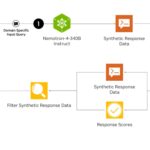In a significant stride towards enhancing cancer care, Color Health has formed a partnership with OpenAI to leverage advanced artificial intelligence in expediting cancer patient treatment. With a mission to transform cancer care, Color Health has introduced a new copilot application powered by OpenAI’s GPT-4o, making personalized and efficient cancer treatment more accessible than ever before.
For over a decade, Color Health has been dedicated to improving healthcare access, serving over 7 million patients. This collaboration began in 2023 with the American Cancer Society, aiming to combat cancer—the second leading cause of death in the United States and a major driver of healthcare costs. With OpenAI’s expertise, Color Health developed a copilot tool that extracts, normalizes, and integrates patient medical data with comprehensive clinical knowledge. The result is a customized, research-based treatment plan tailored to individual patient needs.
Addressing the Complexities of Cancer Treatment
The complexity and time-sensitive nature of cancer treatment present significant challenges. Slight delays in diagnosis and screening can increase mortality risk by 6–13%. Moreover, the variability in individual risk factors makes standardized guidelines insufficient for many patients. Color Health’s innovative copilot application aims to bridge these gaps.
By utilizing GPT-4o, the copilot tool efficiently processes diverse patient information from various formats, such as PDFs and clinical notes. It answers critical questions about necessary screenings and identifies any missing diagnostics, creating personalized plans for patients. This information is then subject to human oversight—clinicians review and refine the AI-generated plans to ensure accuracy and comprehensiveness before incorporating them into patient care.
Dr. Keegan Duchicela, a primary care physician at Color Health, acknowledges the tool’s impact: “The guidelines are constantly evolving, and individual risk factors aren’t always immediately clear. This technology helps streamline the process, ensuring we don’t miss crucial diagnostics.”
Pilot Implementation and Results
Color Health has begun to implement this groundbreaking tool in collaboration with the UCSF Helen Diller Family Comprehensive Cancer Center (HDFCCC). Initially, this involves a retrospective evaluation followed by a targeted rollout. Patients benefit from a significant reduction in time to diagnosis and treatment thanks to the copilot’s ability to pinpoint missing diagnostics swiftly.
Dr. Alan Ashworth, President of UCSF HDFCCC, emphasizes the importance of such tools: “Time lost in collating complete diagnostic workups can delay treatment initiation, but tools like the copilot can improve efficiency and accuracy, allowing providers to focus on providing top-tier care.”
Preliminary results show that using the copilot, healthcare providers can identify four times more missing labs, imaging, and biopsy results compared to traditional methods. Additionally, clinicians can perform these analyses in an average of five minutes—a task that might otherwise take weeks. These promising outcomes have the potential to drastically improve cancer treatment timelines and patient outcomes.
Upholding Safety and Privacy
Color Health’s commitment to patient safety and privacy remains paramount. OpenAI’s HIPAA-compliant data protection standards ensure that patient data is handled securely throughout the process. The copilot system is designed with a “clinician-in-the-loop” approach, further safeguarding patient care quality by ensuring that every AI-generated plan is scrutinized and adjusted by medical professionals.
Future Prospects
Looking ahead, Color Health plans to extend the application of its AI-powered copilot tool to over 200,000 patients by the end of 2024. This measured rollout will incorporate several layers of quality assurance to maintain high standards of care. Dr. Karen Knudsen, CEO of the American Cancer Society, advocates for this technological advancement: “Combining AI technologies with digitally-enabled clinical workflows can expedite care, benefiting patients, clinicians, and payers alike.”
With this innovative integration of AI technology into cancer treatment workflows, Color Health and OpenAI are set to revolutionize patient care, ensuring faster and more personalized treatment for cancer patients across the board.



